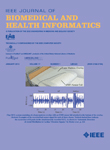
IEEE Journal of Biomedical and Health Informatics
Scope & Guideline
Advancing the Intersection of Technology and Healthcare
Introduction
Aims and Scopes
- Biomedical Data Analysis and Machine Learning:
The journal focuses on the application of machine learning techniques to analyze biomedical data, including genomics, imaging, and electronic health records. It promotes research that develops algorithms for predictive modeling, classification, and risk assessment in healthcare. - Health Monitoring Technologies:
Research in this area includes the development and validation of wearable and remote monitoring devices that track physiological parameters. The journal highlights studies that utilize these technologies for chronic disease management and real-time health monitoring. - Medical Imaging and Image Processing:
A core area of the journal is the application of deep learning and other computational techniques to enhance medical imaging. This includes image segmentation, classification, and analysis to support diagnosis and treatment planning. - Health Informatics and Decision Support Systems:
The journal publishes research that integrates health informatics with clinical workflows, emphasizing the development of decision support systems that aid healthcare professionals in making evidence-based decisions. - Privacy and Security in Health Data:
Given the sensitive nature of health data, the journal addresses methodologies that ensure privacy and security in the sharing and analysis of health information, particularly in the context of IoT and federated learning. - Patient-Centric Approaches and Digital Health:
Research that emphasizes user engagement, personalized medicine, and patient-centric health solutions is a significant focus. The journal encourages studies that explore the intersection of technology and patient care.
Trending and Emerging
- Artificial Intelligence in Healthcare:
AI continues to dominate the research landscape, with a surge in studies applying deep learning and machine learning techniques to improve diagnostics, treatment outcomes, and personalized medicine. - Wearable Health Technology and Remote Monitoring:
There is an emerging trend in research focusing on wearable devices and remote health monitoring solutions. This includes advancements in sensor technology and algorithms for real-time data processing, which are critical for managing chronic diseases. - Federated Learning and Privacy-Preserving Techniques:
With increasing concerns over data privacy, there is a growing focus on federated learning approaches that allow collaborative model training without sharing sensitive health data. This trend is vital for enhancing the security of health informatics. - Multimodal Data Integration:
The integration of multimodal data sources, such as combining imaging, genomic, and clinical data, is gaining traction. Researchers are exploring how these diverse datasets can improve predictive modeling and patient outcomes. - Telehealth and Digital Therapeutics:
The COVID-19 pandemic has accelerated the development of telehealth solutions and digital therapeutics, leading to an increase in research focused on remote patient care, virtual consultations, and digital health interventions. - Explainable AI in Medical Applications:
As AI becomes more prevalent in healthcare, there is a rising emphasis on explainability and transparency in AI models. Researchers are developing methods to ensure that AI-driven decisions can be understood and trusted by clinicians.
Declining or Waning
- Traditional Statistical Methods in Health Research:
There seems to be a reduced focus on conventional statistical approaches in favor of more advanced machine learning and artificial intelligence techniques. This shift indicates a growing preference for complex models that can handle high-dimensional data and provide deeper insights. - Basic Health Technology Assessments:
Research that simply evaluates the efficacy of health technologies without integrating advanced computational methods or data analytics appears less frequently. The focus has shifted towards more sophisticated analyses that combine multiple data sources and advanced algorithms. - Single-Modal Data Approaches:
The use of single-modality data for health assessments is becoming less common, as there is a growing emphasis on multimodal data integration. Studies that solely rely on one type of data source, such as imaging or clinical records, are being overshadowed by research that combines various modalities. - General Health Informatics without Specific Applications:
There is a noticeable decline in publications that discuss health informatics in broad terms without a specific application or case study. The journal is increasingly favoring research that demonstrates practical implementations and real-world impacts.
Similar Journals

JAMIA Open
Unlocking knowledge, enhancing healthcare systems.JAMIA Open is an open-access journal dedicated to advancing the field of health informatics, published by Oxford University Press. Since its inception in 2018, the journal has provided a platform for novel research, reviews, and case studies that bridge the gap between healthcare and information technology. With an impressive impact factor and a current classification in the Q2 quartile for Health Informatics, JAMIA Open has established itself as a vital resource for researchers and practitioners alike, facilitating the dissemination of innovative findings that contribute to the evolution of healthcare systems. Based in the United States, the journal is committed to providing free and equitable access to high-quality research, thus promoting a collaborative and informed approach to tackling pressing health issues. As it continues to grow and evolve, JAMIA Open remains a cornerstone in the landscape of health informatics, appealing to a diverse audience of researchers, professionals, and students looking to inspire change in their fields.

JMIR Medical Informatics
Connecting Researchers and Practitioners in Health InformaticsJMIR Medical Informatics is a leading open access journal dedicated to the field of medical informatics, published by JMIR Publications, Inc. since 2013 in Canada. With an impressive impact factor and a distinguished Q2 ranking in both Health Informatics and Health Information Management categories, this journal plays a pivotal role in disseminating cutting-edge research and innovative practices. Covering a wide scope that includes clinical informatics, health information systems, and data analytics, JMIR Medical Informatics provides valuable insights for researchers, practitioners, and policymakers alike. The journal is accessible to a global audience, ensuring that pioneering studies and methodologies reach those who can apply them to enhance health outcomes. With its commitment to advancing the body of knowledge in medical informatics, this journal stands as a vital resource for anyone involved in or studying the intersection of healthcare and technology.

Healthcare Technology Letters
Elevating patient care through data-driven innovations.Healthcare Technology Letters is a leading open-access journal published by WILEY that has been at the forefront of disseminating cutting-edge research in the field of health informatics and health information management since its inception in 2014. With an E-ISSN of 2053-3713, this esteemed journal is recognized for its commitment to advancing knowledge and practice in healthcare technology, making it a vital resource for researchers, professionals, and students alike. The journal's scope encompasses a wide range of topics, including digital health solutions, data management, and innovative technologies that enhance patient care. It holds a respectable position in the academic community, featuring a Q3 ranking in both health informatics and health information management as of 2023, and consistently contributing to high-impact research evidenced by its Scopus rankings. By providing open access to its content since 2017, Healthcare Technology Letters ensures that valuable insights and breakthroughs can reach a broader audience, furthering the impact of its published work on the global health landscape.

BMJ Health & Care Informatics
Transforming Health Care Through Innovative InformaticsBMJ Health & Care Informatics, published by the esteemed BMJ Publishing Group, stands at the forefront of the rapidly evolving field of health informatics. Established as an Open Access journal in 2019, it is dedicated to disseminating high-quality research that enhances the integration of health care with information technologies. With a prominent Q1 ranking in 2023 across categories such as Computer Science Applications, Health Informatics, and Health Information Management, this journal serves as an essential resource for researchers and practitioners alike. The journal is indexed in reputable databases and boasts impressive Scopus ranks—notably, it is placed #43 among Health Informatics journals. The aim is to foster innovation and understanding in health care practices through rigorous research and collaboration. Encompassing a wide spectrum of topics within health data science, usability, and outcomes research, BMJ Health & Care Informatics is pivotal for anyone involved in advancing health care through technology.
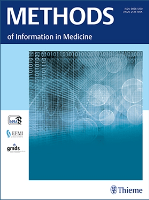
METHODS OF INFORMATION IN MEDICINE
Bridging Clinical Practice and Information Technology for Better Outcomes.METHODS OF INFORMATION IN MEDICINE, published by Georg Thieme Verlag KG, stands at the forefront of medical knowledge dissemination, pushing the boundaries of Advanced and Specialized Nursing, Health Informatics, and Health Information Management. Established in 1962, this prestigious journal has continuously evolved to address the dynamic landscape of healthcare and information technology, aiming to bridge the gap between clinical practice and innovative information technologies. With a robust impact factor reflected in its 2023 Scopus rankings, where it holds a commendable position in Q1 for Advanced Nursing, it serves as an invaluable resource for researchers, practitioners, and students alike. While it maintains a subscription-based access model, the journal fosters the exchange of pioneering methodologies and transformative ideas that are crucial for advancing healthcare delivery and improving patient outcomes. Explore the latest research, expert insights, and cutting-edge developments that solidify the journal’s role as a leader in the interdisciplinary approach to medicine and information systems.
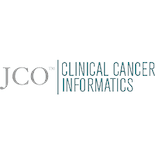
JCO Clinical Cancer Informatics
Unlocking the potential of cancer data for better health outcomes.Welcome to JCO Clinical Cancer Informatics, an esteemed journal at the forefront of the intersection between oncology and health informatics. Published by Lippincott Williams & Wilkins, this journal is dedicated to advancing the understanding and application of cancer data through innovative informatics solutions. Since its inception in 2017, JCO Clinical Cancer Informatics has established itself as a critical resource for researchers, practitioners, and students, as evidenced by its high rankings in the 2023 Scimago Quartiles—Q2 in Cancer Research and Q1 in both Health Informatics and Oncology. With a commitment to open access, this journal aims to disseminate groundbreaking research findings that enhance cancer care and inform public health strategies. Positioned in the United States, it serves as a pivotal platform for sharing knowledge and fostering collaboration within the global cancer research community.
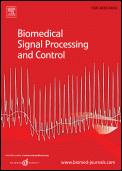
Biomedical Signal Processing and Control
Bridging disciplines for impactful biomedical solutions.Biomedical Signal Processing and Control is a premier academic journal published by ELSEVIER SCI LTD that stands at the forefront of the rapidly evolving fields of biomedical engineering, health informatics, and signal processing. With an impressive impact factor reflecting its scholarly influence and high standards of research, this journal has been recognized in the Q1 quartile category across multiple disciplines as of 2023. Specifically, it holds esteemed positions within Biomedical Engineering, Health Informatics, and Signal Processing, where it ranks in the top tier of its field on Scopus: #19/131, #21/138, and #47/303 respectively. Published continually from 2006 to 2024, the journal serves as a critical platform for researchers, healthcare professionals, and students, fostering innovation in signal processing techniques and their applications in biomedical systems. Access to cutting-edge research and methodologies makes it an indispensable resource for advancing knowledge and practice within these interdisciplinary domains.
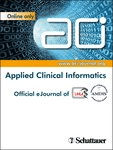
Applied Clinical Informatics
Exploring the future of healthcare through applied informatics.Applied Clinical Informatics is a leading journal dedicated to the expanding field of health informatics and its applications within clinical settings. Published by GEORG THIEME VERLAG KG in Germany, this journal serves as a pivotal platform for researchers and professionals engaged in the integration of technology and healthcare, aiming to improve patient outcomes through innovative informatics solutions. With a solid Q2 ranking in multiple disciplines including Computer Science Applications, Health Informatics, and Health Information Management, it reflects its prominent position in the academic landscape. The journal provides accessible content while fostering dialogue on key issues and advancements in clinical informatics. Covering a wide array of topics from data management to e-health applications, Applied Clinical Informatics is essential reading for those looking to stay attuned to the latest research and developments from 2009 to 2024, enriching the knowledge base of students, professionals, and researchers worldwide.
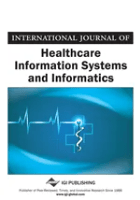
International Journal of Healthcare Information Systems and Informatics
Shaping the evolution of healthcare through data and technology.International Journal of Healthcare Information Systems and Informatics is a prestigious academic journal published by IGI Global, focusing on the vital intersection of healthcare and information technology. With an ISSN of 1555-3396 and E-ISSN of 1555-340X, this journal serves as a pivotal platform for researchers, professionals, and students to explore innovative solutions and advancements in healthcare informatics. As of 2023, it holds a commendable Q3 ranking in categories such as Information Systems and Medicine, highlighting its significant contribution to the academic community. Covering a wide range of topics from healthcare data management to the implementation of information systems in clinical settings, the journal aims to foster critical discussions and disseminate impactful research. With a publication history spanning from 2006 to 2024, it continues to play a crucial role in guiding the future of healthcare information systems. Readers can access this journal through traditional subscription methods, ensuring that leading-edge research reaches those most invested in the evolution of healthcare informatics.
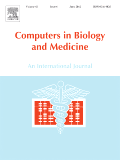
COMPUTERS IN BIOLOGY AND MEDICINE
Exploring the Frontiers of Health Informatics and Computational BiologyCOMPUTERS IN BIOLOGY AND MEDICINE is a prestigious academic journal published by Pergamon-Elsevier Science Ltd, dedicated to advancing the fields of Computer Science Applications and Health Informatics. With an impressive impact factor and ranking within the Q1 quartile for both categories, this journal plays a crucial role in disseminating high-quality research findings that influence cutting-edge developments at the intersection of computing and healthcare. Covering a broad range of topics from computational biology to medical informatics, it serves as a vital resource for researchers, professionals, and students striving to harness technology for medical advancements. The journal has been publishing since 1970 and continues to evolve, incorporating the latest trends and innovations in the field, thereby ensuring that it remains a key contributor to scientific inquiry and knowledge. With accessible content and a global reach, COMPUTERS IN BIOLOGY AND MEDICINE invites submissions that elevate the understanding and application of computational methods in biological and medical contexts.